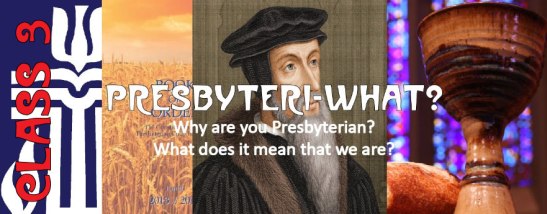Presbyteri-What? Session 3

POLITY is the system of rules, based upon collective beliefs and shared values that govern an association or group of people.
The way that we organize ourselves as a people following Jesus as his disciples is what we called the church. In Greek the word is ekklesia (like ecclesiastic). The first part “ek-“ is a prefix meaning “out from and to” indicating movement. The root word “klesia” comes from the word “kaleo” meaning “to call”. The word church thus means a community of people who are called out from the world/place in which they are; or a community of people called to a particular common task or way of being.
When we talk of Presbyterian Polity then we are talking about the way we live our faith together as this called people, called to new creation.
From our introduction to Reformed Theology (and the history of the emergence of the Reformation movement) the notion of God’s agency, that God alone acts through Grace is at the heart of our organizing, connection and polity. The church for us then is how we organize together to recognize, celebrate, nurture and sustain the calling of each person to follow Christ both individually and corporately. None of us alone is the Church, but together with disciples of all times and places, we are the Church. We’re thus connected by faith to those that have lived before us, as well as those that are church across the spectrum of human diversity, cultural specificity and geopolitical expanse.
Our polity is then how we live out the solas expressed by the reformers in their description of faith. It’s how we identify, live and act together as mutually interdependent people both saved and called by grace to a new way of life.
We understand there to be three basic types of polity: congregational, episcopal and Presbyterian. In the first the church is directly governed by the people who make up the congregation. There is little or no formal connection between congregations. In Episcopal polity the connection between the congregations flows from an understanding of apostolic succession of the clergy. While congregants have a say in this polity, the power is top down, from the highest ranking bishop (episcopos in Greek) down through the clergy to the laity. In Presbyterian polity, power if representative, constitutional and relational. Elders (teaching and ruling, derived from the Greek word for elder: presbyteros) are elected by the congregation to govern the church as the session. In our connections between congregations we structure our collaboration through the equal agency of elders from across the wider Church. Power within the church (local and national) is exercised by groups of officers, rather than individuals, rooted not in a hierarchy but in a common understanding and covenant of what it means to be church. In the PCUSA we call this covenant our constitution which is made up of the Book of Order and the Book of Confessions, containing both rules and creeds.
In our life together as church we affirm several key things in our constitution, including:
I. Christ alone (not any person or group) is the head of the Church.
II. The great ends or purpose of the church, which provide guidance for the church as faithful expressions of the Christian gospel and as what God calls the church to be and do. From the Book of Order F-1.0304
- the proclamation of the gospel for the salvation of humankind;
- the shelter, nurture, and spiritual fellowship of the children of God;
- the maintenance of divine worship;
- the preservation of the truth;
- the promotion of social righteousness;
- and the exhibition of the Kingdom of Heaven to the world.
III. And “God alone is Lord of the conscience,” meaning that disciples have that in all matters we, as the church, respect the rights of private judgment of each disciple (knowing that human nature is broken and tends towards tyranny and manipulation). Book of Order F-3.0101
ADDITIONAL READING FOR A DEEPER GRASP OF PRESBYTERIAN POLITY:
- “Who’s in Charge” from Presbyterians in the Bible Belt (easiest)
- “A Polity for the Church” from Presbyterian Polity for Church Officers (more in depth)
- The first three chapters of the Book of Order (F1, F2, & F3) (original text)
QUESTIONS FOR PONDERING:
- What surprises you about the way in which we’re church (polity)?
- How is our polity coherent/inconsistent with our theology?
- What questions does this conversation stir up in you?

Pingback: Presbyteri-What? Class 6: Putting it all together | CAPC Oakland